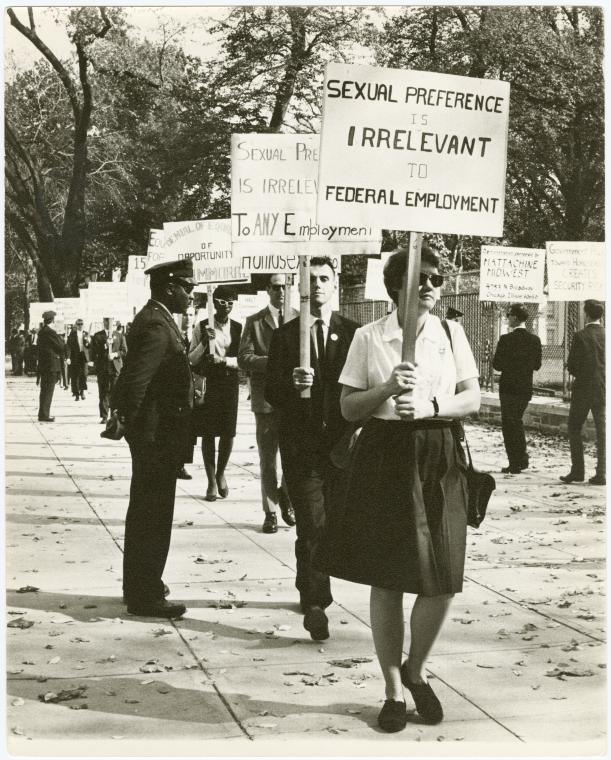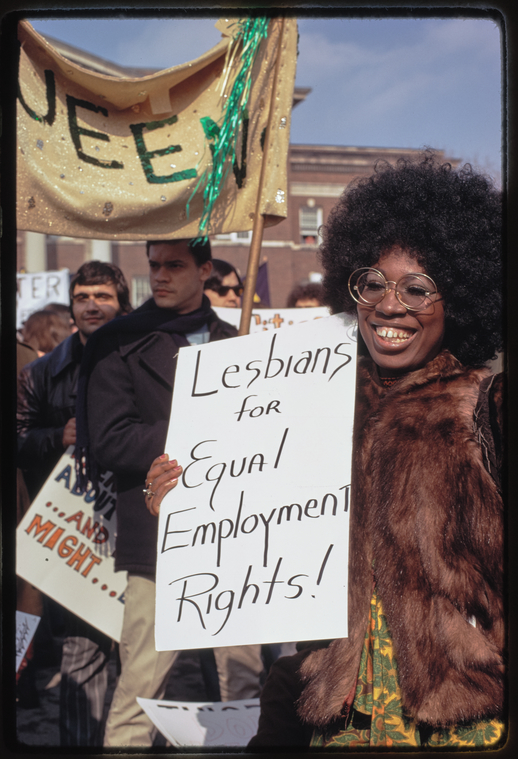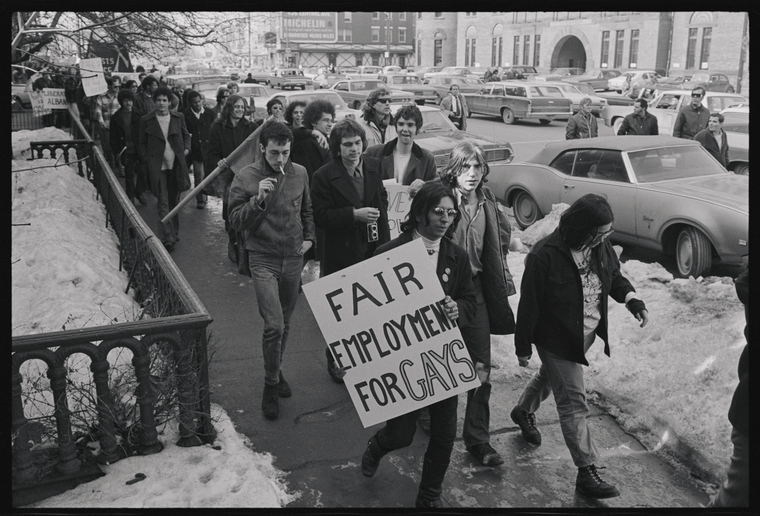LGBTQ at NYPL
The Long History of LGBTQ Employment Rights Activism
This week’s landmark Supreme Court ruling on LGBTQ employment rights, Bostock v. Clayton County, is the culmination of over 60 years of LGBTQ civil rights activism. This history is deeply reflected in the New York Public Library’s collections. From the 1950s onward, the right to employment was a major concern of homophile-era activists, in organizations like the Mattachine Society and the Daughters of Bilitis. After the passage of the Civil Rights Act of 1964, LGBTQ activists began in earnest to assert their own rights to employment. This can be seen dramatically in the series of demonstrations for the right to federal employment and military service held in 1965 at a range of federal agencies, including the Civil Service Commission, the Pentagon, and the White House. Here is an image of activist Barbara Gittings holding a sign “Sexual Preference is Irrelevant to Federal Employment” in the third picket of the White House in 1965.

In the same year, members of the Mattachine Society of New York surveyed a range of area businesses to document the reality of employment discrimination against LGBTQ people. Here is a copy of one of the completed surveys, wherein a company made clear that they would refuse to employ known homosexuals.

The Mattachine Society, Inc. of New York Records are held by the New York Public Library’s Manuscripts & Archives Division and can be accessed online via the Archives of Sexuality and Gender database from Gale from home with your library card.
After Stonewall, this activism became even more intensive with calls by LGBTQ activists for statewide LGBTQ civil rights bills. This can be seen in the demands of activists on the LGBTQ march on Albany in 1971, in which employment rights were a major concern, documented by photojournalist Diana Davies.


At the same time that gay and lesbian activists were demonstrating for employment rights, transgender and gender-nonconforming activists were also fighting against employment discrimination through organizations like the Erickson Educational Foundation, Street Transvestite Action Revolutionaries, and Labyrinth Foundation Counseling/Gender Service, Inc., among others. This work continues to the present day with contemporary activists like the New York Transgender Advocacy Group, led by Kiara St. James. You can hear and read an oral history interview online with Kiara St. James that addresses employment discrimination and current transgender activism through the Library’s partnership with the New York City Trans Oral History project.

Despite the passage of anti-discrimination legislation in many cities and states, these struggles have continued to the present day. This week’s SCOTUS decision is hopefully a major turning point in this history. To learn more about the history of LGBTQ employment rights, you can consult the collections linked to above and read the following recent books, some of which were researched at the New York Public Library.

The Deviant's War: The Homosexual vs. the United States of America by Eric Cervini

Victory: The Triumphant Gay Revolution by Linda Hirshman

Transgender Employment Experiences: Gendered Perceptions and the Law by Kyla Bender-Baird

Transgender History: The Roots of Today's Revolution by Susan Stryker
Read E-Books with SimplyE
 With your library card, it's easier than ever to choose from more than 300,000 e-books on SimplyE, The New York Public Library's free e-reader app. Gain access to digital resources for all ages, including e-books, audiobooks, databases, and more.
With your library card, it's easier than ever to choose from more than 300,000 e-books on SimplyE, The New York Public Library's free e-reader app. Gain access to digital resources for all ages, including e-books, audiobooks, databases, and more.
If you don’t have an NYPL library card, New York State residents can apply for a digital card online or through SimplyE (available on the App Store or Google Play).
Need more help? Read our guide to using SimplyE.